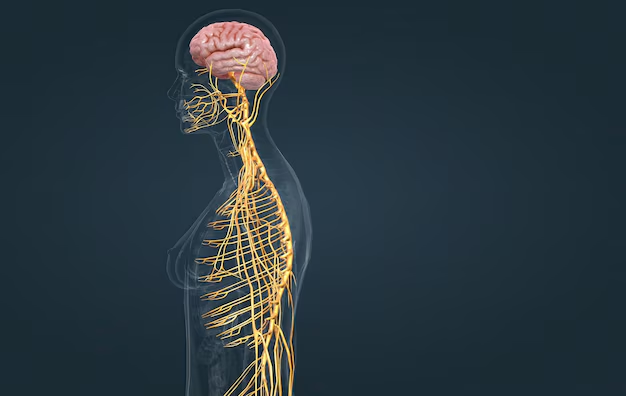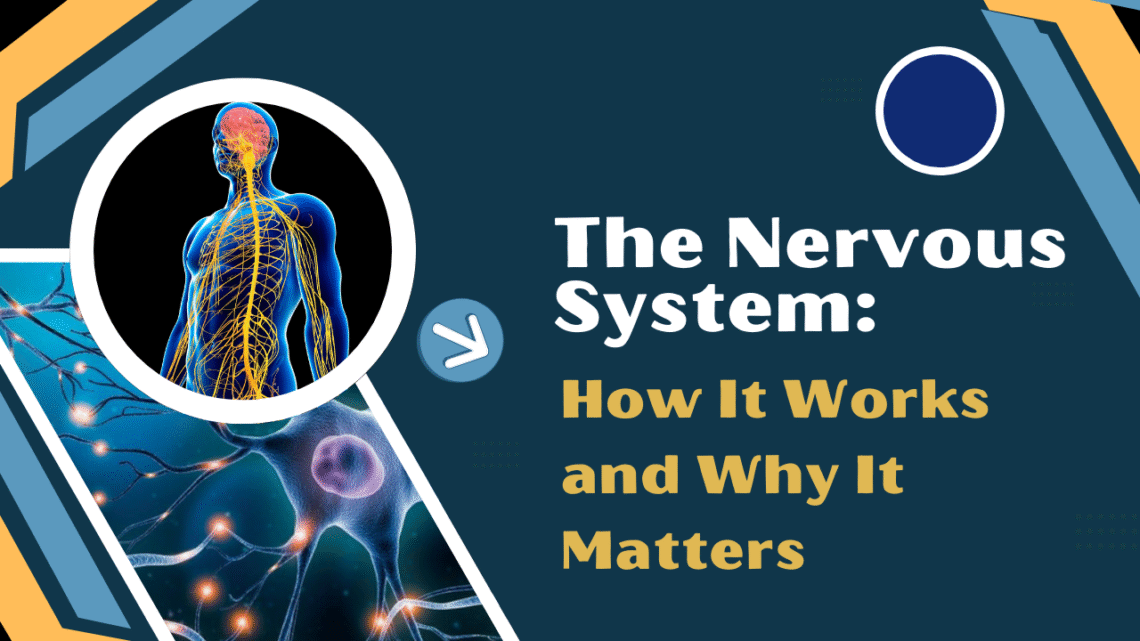The human nervous system is an intricate and essential network that serves as the body’s command and communication center. It regulates countless functions—both voluntary and involuntary—including heartbeat, breathing, digestion, movement, memory, emotions, and even perception. From the simplest reflex to the most complex thought, the nervous system is behind it all.
Comprised of the brain, spinal cord, and a vast network of nerves, the nervous system works tirelessly to keep you functioning and responsive to your environment. When this system is disrupted, it can lead to a wide range of health issues, including chronic pain, cognitive decline, and neurodegenerative diseases.
In this comprehensive guide, we’ll delve into how the nervous system is structured, its various functions and types, and the most common disorders that can affect it. You’ll also find 8 practical, science-backed tips to support nervous system health—helping you stay mentally sharp, physically balanced, and emotionally resilient.
1. What is the Nervous System?

The nervous system is a highly specialized network of nerve cells (neurons) and fibers that plays a vital role in maintaining communication throughout the body. It acts like a high-speed messaging system, sending signals between the brain, spinal cord, and various organs and tissues.
This system is responsible for both voluntary actions—like walking, speaking, and writing—and involuntary functions such as breathing, heartbeat, and digestion. It ensures that your body responds appropriately to internal and external stimuli, keeping everything in sync.
In addition to controlling movement and function, the nervous system also processes sensory information. Whether it’s the warmth of the sun, the sound of music, or the scent of food, your nervous system transmits those sensations to the brain, allowing you to interpret and react to the world around you.
It consists of two major parts:
- Central Nervous System (CNS): Includes the brain and spinal cord.
- Peripheral Nervous System (PNS): Consists of all the nerves branching from the brain and spinal cord to the rest of the body.
Together, these systems allow us to interact with and respond to the world around us.
2. Components of the Nervous System
A. Brain
The brain is the control center of the nervous system. It’s responsible for processing sensory data, interpreting emotions, initiating motor functions, storing memories, and guiding decision-making.
Major parts of the brain:
- Cerebrum: Controls speech, emotions, reading, writing, and learning.
- Cerebellum: Regulates balance, posture, and coordination.
- Brainstem: Controls basic life functions like heartbeat, breathing, and digestion.
B. Spinal Cord
The spinal cord is the main pathway for transmitting information between the brain and the rest of the body. It also manages reflex actions independently from the brain.
C. Nerves
Nerves are bundles of fibers that transmit electrical impulses. They include:
- Sensory nerves (afferent): Carry signals from the body to the brain.
- Motor nerves (efferent): Transmit commands from the brain to muscles and organs.
3. Types of Nervous Systems
A. Central Nervous System (CNS)
The CNS integrates sensory information and responds accordingly. It is protected by:
- Skull and vertebrae
- Cerebrospinal fluid (CSF)
- Meninges (protective layers)
B. Peripheral Nervous System (PNS)
The PNS is divided into:
- Somatic Nervous System: Controls voluntary movements.
- Autonomic Nervous System (ANS): Regulates involuntary functions like heart rate and digestion.
The ANS is further divided into:
- Sympathetic Nervous System: Prepares the body for stress (‘fight or flight’).
- Parasympathetic Nervous System: Promotes rest and digestion.
4. Functions of the Nervous System
The nervous system performs five primary functions:
- Sensory Input: Receives signals from sensory organs.
- Integration: Processes sensory data and formulates responses.
- Motor Output: Executes responses via muscle movement.
- Homeostasis: Maintains internal stability, such as body temperature and pH.
- Mental Activities: Enables thought, learning, memory, and emotions.
5. Common Nervous System Disorders
Nervous system disorders can be congenital, degenerative, or caused by injury, infection, or lifestyle. Some of the most common conditions include:
A. Alzheimer’s Disease

- A progressive disorder leading to memory loss and cognitive decline.
- No cure, but lifestyle changes and medications can slow progression.
B. Parkinson’s Disease
- A neurodegenerative condition causing tremors, stiffness, and movement difficulties.
- Associated with dopamine deficiency.
C. Epilepsy
- Characterized by recurrent seizures due to abnormal electrical activity in the brain.
D. Multiple Sclerosis (MS)
- An autoimmune disease that damages the protective covering of nerves.
E. Stroke
- Caused by disrupted blood flow to the brain.
- Can lead to paralysis, speech issues, and memory loss.
F. Peripheral Neuropathy
- Damage to peripheral nerves, often linked with diabetes or infections.
6. Causes and Risk Factors of Nervous System Issues
Some causes and risk factors include:
- Age (e.g., Alzheimer’s risk increases with age)
- Genetics
- Infections (e.g., meningitis, encephalitis)
- Autoimmune conditions
- Poor lifestyle habits (e.g., smoking, inactivity, unhealthy diet)
- Head injuries
- Environmental toxins
7. Diagnosis and Treatment
A. Diagnosis
Common diagnostic tools:
- MRI and CT scans
- EEG (electroencephalogram)
- Lumbar puncture (spinal tap)
- Neurological exams
B. Treatment
Treatment depends on the disorder and may include:
- Medication
- Surgery
- Physical or occupational therapy
- Counseling and psychiatric care
- Lifestyle modification
How to Keep Your Nervous System Healthy: Top 8 Tips
Maintaining a healthy nervous system is crucial for overall well-being, longevity, and optimal daily performance. As the control center of your body, the nervous system impacts everything from your thoughts and emotions to physical movements and organ function.
A well-functioning nervous system helps you think clearly, move efficiently, manage stress better, and respond quickly to changes in your environment. On the flip side, poor nervous system health can lead to fatigue, brain fog, anxiety, or even more serious neurological disorders.
The good news is that there are practical, science-backed steps you can take to support and protect your nervous system throughout life. From proper nutrition and physical activity to stress management and sleep hygiene, these simple habits can make a powerful difference. Below, we’ll explore 8 essential tips to keep your nervous system strong, balanced, and resilient.
1. Eat a Brain-Healthy Diet
- Consume foods rich in omega-3 fatty acids, antioxidants, and vitamins B, C, D, and E.
- Include leafy greens, berries, fatty fish, nuts, seeds, and whole grains.
- Stay hydrated—water is crucial for nerve function.
Tip: Try the Mediterranean diet, which supports both brain and heart health.
2. Get Regular Physical Activity
Regular physical activity is one of the most effective ways to support your nervous system. Exercise increases blood flow to the brain, ensuring that your nerve cells receive the oxygen and nutrients they need to function properly.
More importantly, movement stimulates the release of brain-derived neurotrophic factor (BDNF)—a protein that promotes the survival and growth of nerve cells. This helps improve communication between neurons and enhances memory, learning, and overall brain performance.
Whether it’s walking, swimming, dancing, or strength training, consistent exercise strengthens both the body and the nervous system. Just 30 minutes a day can help maintain neurological health, reduce stress, and slow age-related cognitive decline. So, get moving—it’s one of the best investments you can make for your brain and nerves.
- Aim for 150 minutes of moderate aerobic exercise per week.
- Include strength training and balance exercises.
Tip: Walking, yoga, and swimming are excellent for nervous system function.
3. Prioritize Quality Sleep

Sleep is essential for maintaining a healthy nervous system. During deep sleep, your brain and nerves undergo critical repair processes, including the removal of toxins and the restoration of neural connections that affect learning and memory.
Without enough restful sleep, the nervous system struggles to perform efficiently. You may notice slower reaction times, reduced concentration, mood swings, and impaired decision-making. Chronic sleep deprivation can even increase the risk of neurological disorders.
To support your nervous system, aim for 7–9 hours of quality sleep each night. Establish a consistent sleep routine, limit screen time before bed, and create a calming environment. Your brain needs this downtime to recharge, process information, and keep your entire body functioning smoothly.
- Adults need 7–9 hours of quality sleep per night.
- Avoid screens and caffeine before bedtime.
Tip: Keep a regular sleep schedule, even on weekends.
4. Manage Stress Effectively
Chronic stress isn’t just mentally exhausting—it has serious physical effects on your nervous system. When stress becomes persistent, your body remains in a prolonged “fight or flight” state, driven by the sympathetic nervous system.
This constant activation floods your body with stress hormones like cortisol and adrenaline. Over time, this can lead to inflammation, disrupt nerve function, weaken the immune response, and increase the risk of conditions such as anxiety, depression, and heart disease.
To support your nervous system, it’s vital to manage stress effectively. Practice deep breathing, mindfulness, yoga, or take regular breaks throughout your day. Even small moments of calm can help restore balance to your nervous system and protect your long-term health.
- Practice deep breathing, meditation, or progressive muscle relaxation.
- Take breaks during the day and engage in hobbies.
🧠 Tip: Daily mindfulness practice can rewire the brain and lower anxiety.
5. Avoid Toxins and Harmful Substances
To keep your nervous system functioning at its best, it’s important to limit or eliminate exposure to harmful substances and environments. Many daily exposures—often overlooked—can quietly damage your nerve health over time.
Avoid excessive alcohol, recreational drugs, and tobacco, as these substances are known to interfere with neurotransmitter function, slow down nerve signal transmission, and increase inflammation. Prolonged exposure can lead to nerve damage, mood disorders, and impaired coordination.
Environmental toxins such as heavy metals (like lead and mercury), certain pesticides, and air pollution can also affect nerve health. Choose organic foods when possible, use natural cleaning products, and ensure proper ventilation in your living and working spaces. Reducing these exposures supports your nervous system and promotes long-term brain and body health.
- Tobacco
- Excessive alcohol
- Recreational drugs
- Environmental toxins (pesticides, heavy metals)
Tip: Choose organic produce when possible and use safe household products.
6. Stay Mentally Active

Just like your body, your brain needs regular workouts to stay in shape. Engaging in mental exercises helps keep your brain sharp, agile, and better equipped to handle stress, memory tasks, and problem-solving.
Activities like reading, solving puzzles, learning a new language, or playing strategy games stimulate different areas of the brain. This encourages the formation of new neural connections, a process known as neuroplasticity, which supports cognitive resilience as you age.
Even social interaction counts as mental stimulation—engaging conversations challenge your thinking and memory. By incorporating mental workouts into your daily routine, you actively support your nervous system and preserve long-term brain function.
- Read books
- Solve puzzles
- Learn a new language or instrument
🧠 Tip: Lifelong learning is one of the best protections against cognitive decline.
7. Protect Your Head
Traumatic brain injuries (TBIs) occur when a sudden impact or jolt disrupts normal brain function. These injuries can range from mild concussions to severe damage that affects movement, memory, emotions, and cognition.
Even seemingly minor head injuries can have long-term consequences, including persistent headaches, difficulty concentrating, mood changes, or increased risk of neurological disorders. That’s why it’s critical to take head injuries seriously—early intervention and rest are key to recovery.
Prevention is just as important. Wearing helmets during sports, using seat belts, and fall-proofing your home are all practical ways to protect your brain. Protecting your head today can help preserve your mental and physical abilities for years to come.
- Always wear helmets during biking, skating, or contact sports.
- Use seatbelts and prevent falls at home (especially in the elderly).
🧠 Tip: Make homes safer with grab bars, proper lighting, and non-slip rugs.
8. Regular Check-Ups and Screenings
Many neurological issues, such as Parkinson’s disease, multiple sclerosis, or peripheral neuropathy, often begin with subtle symptoms—like tingling, balance issues, memory lapses, or mood changes. These signs are easy to overlook but may be the first clues that something deeper is going on.
Early detection can make a significant difference in how these conditions progress and how effectively they can be managed. With prompt diagnosis, treatments such as medication, therapy, or lifestyle adjustments can be introduced early—slowing disease progression and improving quality of life.
Regular health check-ups, listening to your body, and seeking medical advice when something feels “off” are essential steps. By staying vigilant and proactive, you improve your chances of catching potential neurological concerns early, when they’re often more manageable.
- Get regular vision and hearing tests.
- Monitor blood pressure, blood sugar, and cholesterol, which can impact brain health.
🧠 Tip: Talk to a doctor if you experience symptoms like numbness, memory loss, or tremors.
Conclusion: Protecting Your Body’s Command Center
Your brain is often called the body’s command center—and for good reason. It controls every thought, action, emotion, and movement. From solving problems to recalling memories, and from managing stress to regulating bodily functions, your brain is constantly working. Protecting this vital organ is essential for living a full, healthy, and productive life.
The good news is that there are many ways you can support and protect your brain throughout your life. A balanced, nutrient-rich diet plays a powerful role. Foods rich in omega-3 fatty acids, antioxidants, vitamins, and minerals help reduce inflammation, improve memory, and slow down cognitive decline. Incorporating brain-boosting foods like fatty fish, berries, leafy greens, nuts, and whole grains into your meals fuels your mind and body in the smartest way possible.
However, protecting your brain isn’t just about what you eat. It’s also about how you live. Regular physical activity improves blood flow to the brain and supports mental clarity. Quality sleep allows the brain to repair and recharge. Stress management—through techniques like meditation, deep breathing, and mindfulness—reduces the harmful effects of chronic cortisol exposure on brain health. Staying mentally active by learning new things, reading, or solving puzzles also helps keep your mind sharp.
Avoiding harmful habits is equally important. Smoking, excessive alcohol consumption, and high sugar intake can all damage brain function over time. So can ignoring mental health. Anxiety, depression, and long-term stress can take a serious toll on brain performance. Seeking support when needed and prioritizing emotional well-being is a key part of brain protection.
Incorporating healthy lifestyle habits isn’t about perfection—it’s about consistency. Small, daily choices have a big impact over time. Whether it’s swapping processed snacks for a handful of nuts, choosing to walk instead of drive, or shutting down screens an hour before bedtime, every positive step helps strengthen your body’s command center.
In conclusion, protecting your brain is one of the most important things you can do for your long-term health and quality of life. By fueling your mind with the right nutrients, staying active, managing stress, and making healthy choices every day, you lay the foundation for mental sharpness, emotional balance, and overall vitality.
Remember: your brain takes care of you—so take care of it. With the right support, you can keep your command center strong, focused, and resilient for years to come.
Key Takeaways
- The nervous system includes the brain, spinal cord, and peripheral nerves.
- It controls voluntary and involuntary bodily functions.
- Disorders like Alzheimer’s, Parkinson’s, and epilepsy are common but manageable.
- A healthy lifestyle significantly reduces the risk of neurological diseases.
- Follow the top 8 tips to support and maintain optimal nervous system health.
FAQs: Nervous System Health
Q1. What are the main parts of the nervous system?
A: The nervous system is divided into two main parts: the central nervous system (CNS), which includes the brain and spinal cord, and the peripheral nervous system (PNS), which consists of all the nerves outside the CNS.
Q2. What are common signs of nervous system problems?
A: Warning signs include numbness or tingling, memory loss, poor coordination, chronic headaches, vision changes, and muscle weakness. If these persist, consult a healthcare professional.
Q3. How can I naturally support my nervous system?
A: Regular exercise, a balanced diet rich in omega-3s and antioxidants, stress reduction, mental stimulation, and quality sleep all help maintain a healthy nervous system.
Q4. What foods are best for nervous system health?
A: Leafy greens, fatty fish, nuts, seeds, berries, and whole grains provide key nutrients like B vitamins, magnesium, omega-3 fatty acids, and antioxidants.
Q5. Can stress damage the nervous system?
A: Yes. Chronic stress increases cortisol, which can cause inflammation and damage to nerve cells, especially in the brain. Managing stress through mindfulness, physical activity, or therapy is important.
Q6. How important is sleep for the nervous system?
A: Very. Sleep allows the nervous system to repair, consolidate memories, and clear toxins from the brain. Aim for 7–9 hours of quality sleep each night.
Nervous System: Key Functions and Tips for Better Health





